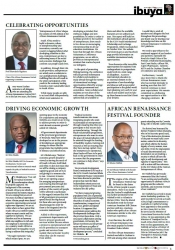Mr Sihle Zikalala - Driving Economic Growth2017-06-05 Mr Sihle Zikalala, MEC for Economic Development, Tourism and Environmental Affairs in KwaZulu-Natal
unpacks the policy of Radical Economic Transformation. Mr Zikalala says, “Our call for radical economic transformation should be properly captured. The background of the economy of South Africa is one which is characterised by historic injustice. We are coming from an era of 342 years of political oppression where African people were denied economic opportunities and social rights were oppressed. We are at a time where we have agreed that South Africa is a rainbow nation, where we must coexist and live together in harmony. We can therefore not live in harmony while one neighbour is rich and one neigbour is extremely poor. As a country, South Africa is a global leader in inequality; we are trying to address that inequality.†“Through Operation Vula, which means open, we are opening space in the economy for cooperatives and emerging SMMEs; as a result we are trying to address poverty in order to avert skewed economic growth.†added Mr Zikalala. All government departments of the provincial government of KwaZulu-Natal have either developed or are in the process of developing an appropriate strategy to ensure that the programme has multiple points of entrance and effectiveness. Mr Zikalala says, “Radical economic growth should be viewed as serving the needs of all South Africans, both black and white. It does not mean that we will be closing a company supplying goods and services and giving it to someone else to run. However, it means that we are opening a space for emerging entrepreneurs and ensuring that through the procurement processes and policies of the country all people will be allowed to participate. In this regard it means that 50% of all government procurement spend should be ring-fenced for those who were previously disadvantaged in order for them to be integrated into the economic mainstream.†Added to this requirement, government departments will have to procure goods and services within the area where a project is operational and will not be permitted to transport goods and services from outside that particular locality when they can be sourced from within. “Radical economic transformations also mean integrating people who want to participate as entrepreneurs through ensuring that they now participate in key sectors such as manufacturing. Through the black industrialists programme, entrepreneurs who want to enter the space of industrialisation will be assisted through the funding of feasibility studies, training and research as well as ensuring that they have startup capital. Once the enterprises are operational, these funds will have to be paid back to the government in order to ensure that the programme can continue to help others,†says Mr Zikalala. The provincial development finance institutions (DFI) such as the KZN Growth Fund and Ithala Development Finance Corporation have been directed to prioritise projects that meet the Black Industrialists criteria as set out in the Department of Trade and Industry (the dti) policy. “We have young and growing population with a lot of potential who need to be supported through the policy of radical economic transformation, irrespective of class, race, gender and spatial location. It is apparent that government cannot address the developmental challenges that the province faces alone. Only a structured collaboration among government, civil society, the labour movement and the private sector will serve as a pillar of the provincial radical economic development process,†concluded Mr Zikalala. www.kznedtea.gov.za |
Mr Sihle Zikalala - Driving Economic Growth
Copyright © 2026 KwaZulu-Natal Top Business
